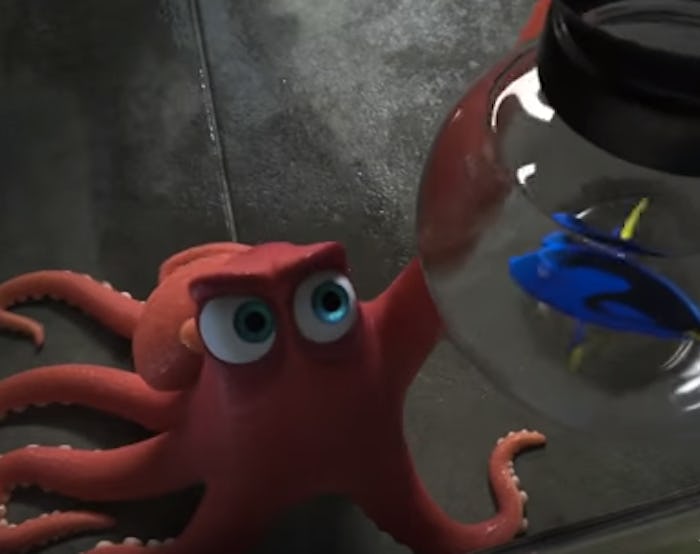Entertainment
Can Octopuses Really Walk On Land? Hank From 'Finding Dory' Is Pretty Impressive
Finding Dory viewers were no doubt amused by Hank, the seven-legged octopus voiced by Ed O'Neill who slinks around the Marine Life Institute, changing color like a chameleon. But how realistic is that? Pixar is known for doing its homework, but then again, the movie is about talking animals. Believe it or not, octopuses really can walk on land when they want to, and in fact, according to Scientific American, it's actually pretty common.
The last time this question came up was when a viral video emerged featuring an octopus walking on land at the Fitzgerald Marine Reserve located within the San Mateo County Park in Moss Beach, California. Marine biologist James Wood told Scientific American he's seen several different species of octopuses crawling about on land. He explained that the animals are nocturnal, which could explain why they're so rarely seen walking around by laypeople. Unfortunately, a healthy sampling of YouTube videos shows that octopuses are a lot less graceful on land than they are in the water; while everyone's favorite reaction GIF shows that the cephalopods are gifted underwater runners, on land they can barely manage the weight of their squishy, bulbous heads (ironically, watching an octopus on land will probably make most humans act like the famous nopetopus).
Julian Finn of the Museum Victoria in Australia told Scientific American that octopuses often emerge from the sea to hunt in tide pools, or to escape from predators. While they do need water to breathe, they can manage on land for several minutes, providing their skin stays moist. Mother Nature Network reported that the animals have been discovered in some pretty strange places, including bookcases and teapots.
But it didn't take a viral video to prove that octopuses could walk on land. According to Smithsonian Magazine, Aristotle wrote about octopuses walking on land in History of Animals way back in 350 B.C.E. However, the Greek philosopher got one big detail wrong; he wrote that "[t]he octopus is a stupid creature," when in fact, they're adept at solving puzzles and navigating mazes. In fact, two-thirds of their neurons are in their tentacles, meaning their arms can actually think. Does that mean that an octopus could conceivably walk out of the ocean, up to your front door, then pick the lock, climb up the stairs, and smother you in your sleep? I don't know; I'm not a marine biologist. Sweet dreams.
